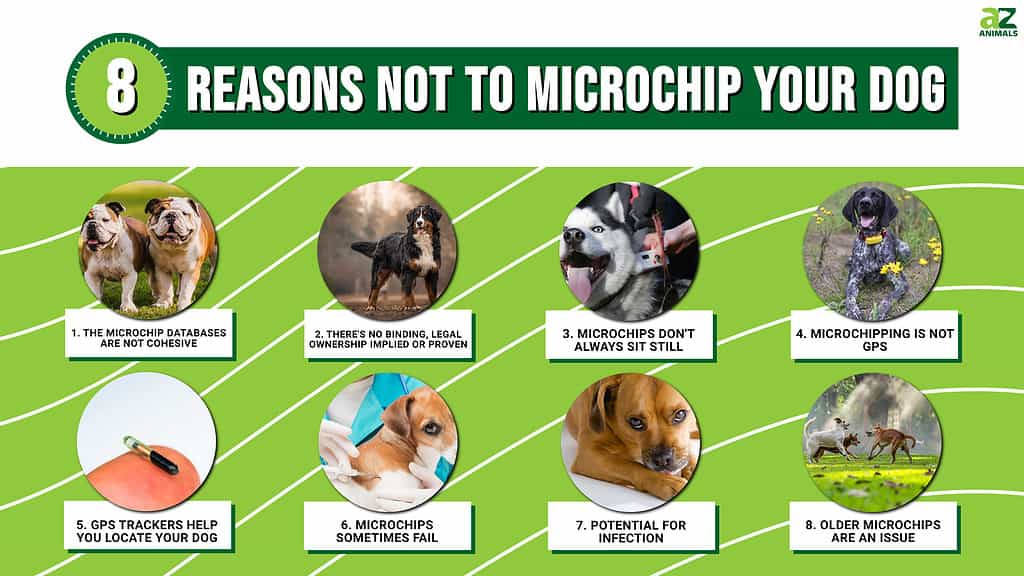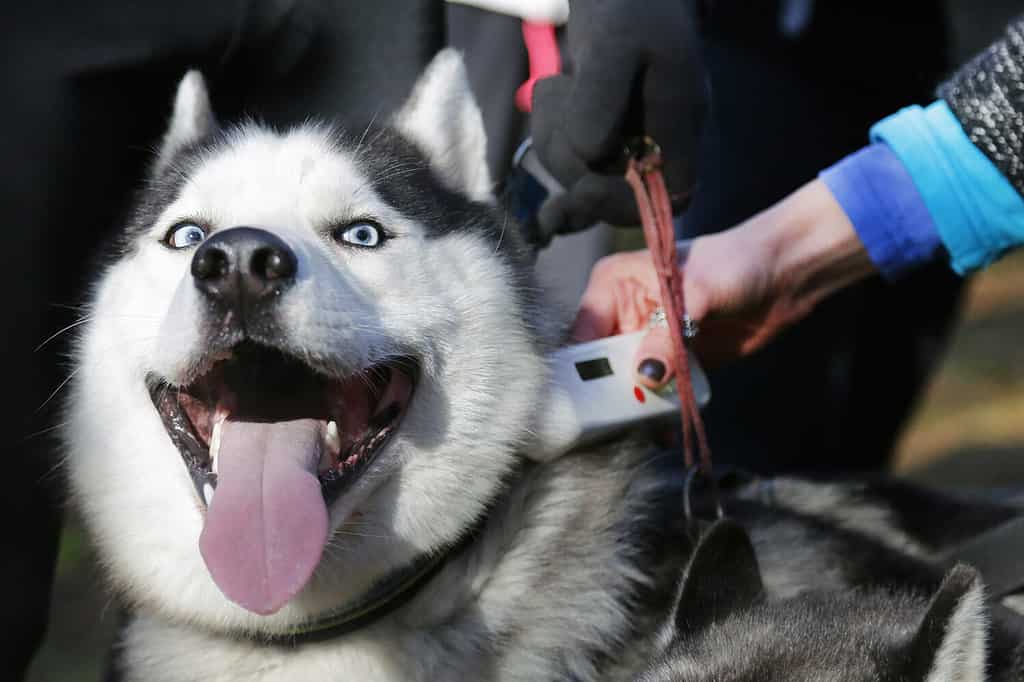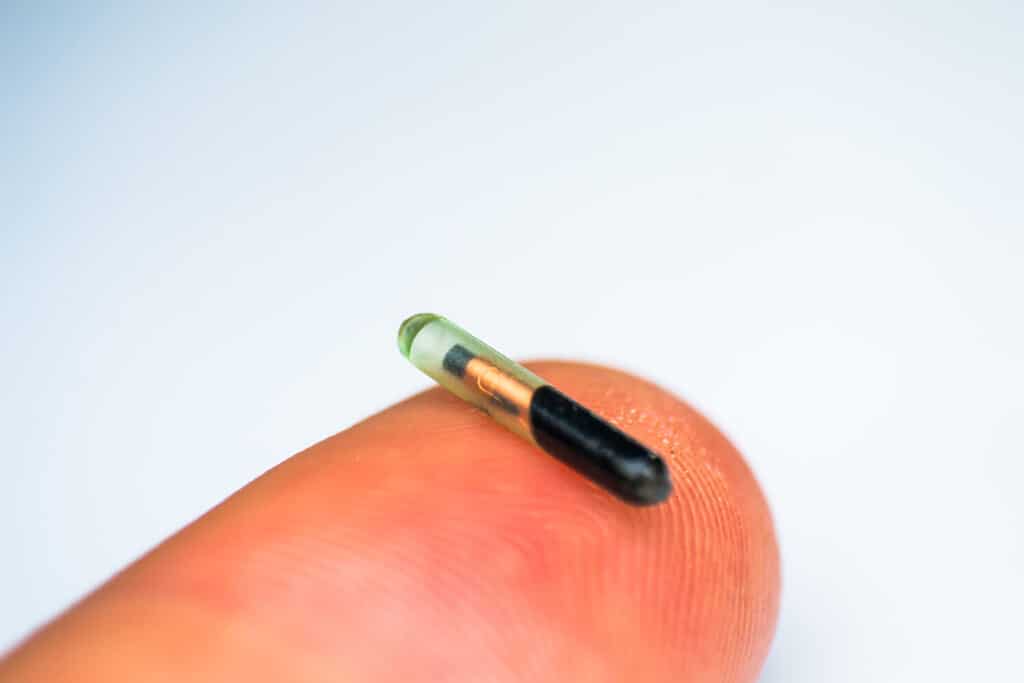There are plenty of reasons not to microchip your dog. However, don’t take that wrong, especially if your four-legged companion has already gone through the process. Microchipping our pets has become very popular in the pet market, especially for those little escape artists who always find a way out of the fence.
However, there are some valid reasons for avoiding microchips, including the fact that some exciting and highly effective trackers out there don’t require a procedure and can locate your animal.

If you’re a U.S. reader, the microchip process is still voluntary. In other countries, such as Australia and the United Kingdom, it’s a mandatory requirement, while in Canada, mandates are sporadically applied throughout the country. Microchipping is not harmful to your dog; however, here are some excellent reasons to reconsider.
1. The Microchip Databases are not Cohesive

Two English Bulldogs dog puppy outdoors meeting.
©Lakshmi3/iStock / Getty Images Plus via Getty Images
There are a lot of databases throughout the United States. This is why, if you get your dog microchipped, the business doing the procedure has to hand you registration paperwork. If you fail to take that paperwork home and register your pup and microchip, it becomes more challenging to track your dog if it escapes.
For instance, someone locates your dog 50 miles (ca. 80 km) from your home. They take the pup to the local shelter, realizing the dog has a microchip. Even if they scan the microchip, there’s no way of knowing which registry the dog belongs to. It’s not like the microchip contains your address.
If you don’t register, they won’t be able to pinpoint the database your dog belongs to and will never be able to reunite you with your lost pup outside of sheer luck.
2. There’s No Binding, Legal Ownership Implied or Proven

Alert and playful!
©xkunclova/Shutterstock.com
This is frustrating and one of the biggest reasons not to microchip your dog. If someone finds your dog a long way from home and they decide to keep it, you’re in for a long, heartbreaking ordeal. Even though the microchip is there, is registered, and indicates you are the owner, that is not legally binding.
The reason it’s not legally binding is because it would be a nightmare for courts and law enforcement to determine if you’re the initiating source of the microchip. Everyone microchips dogs, including shelters, vets, pet rescue operators, owners, breeders, and more.
There is no guarantee under state law in any of the fifty states that your registration and microchip will hold up in court.
3. Microchips Don’t Always Sit Still

Husky Microchip check by Vet Doctor.
©Migle Narbutaite/Shutterstock.com
It sounds terrible, but it’s not typically dangerous to your dog. If you’re looking for reasons not to microchip your dog, this is common. Once the procedure is complete, the microchip moves, and there’s no telling where it will end up. Sometimes, the dog’s body rejects it entirely, like a splinter.
If your dog is lost and later found, a vet will scan it to see if a microchip exists. Of course, the microchip is no longer there, so the vet assumes the dog never had one. From there, your pup will likely end up in the local shelter and potentially be adopted by another family. The good news is that microchip migration is relatively rare.
4. Microchipping is not GPS

GPS tracker device on dog’s collar.
©iStock.com/Eudyptula
For those who have never had their dogs microchipped, the assumption is that a microchip is an effective GPS device. However, that’s not the case. Microchips operate with RFID technology, which helps vets and shelters scan and retrieve specific information.
What a microchip will not do is help you locate your dog’s exact location in real time. If you want something like that, you’ll need an alternative option, which leads us to our next point.
5. GPS Trackers Help You Locate Your Dog

Tiny microchip on the tip of a finger.
©Todorean-Gabriel/Shutterstock.com
An Apple AirTag, Chipolo One, Tile Pro, Samsung SmartTag, Cube Shadow, and more will fit right in on a dog collar. You may have to get a little innovative with how you attach it, but it’s simple enough to make it work. Then there are the more high-tech collars such as Halo.
Of course, anyone who finds your dog can remove and ditch the collar, but you at least have a strong chance of locating it in the meantime. A microchip doesn’t offer this, and with strong GPS alternatives out there, you may want something that will help you find your dog now.
6. Microchips Sometimes Fail

Microchipping process.
©iStock.com/Fly_dragonfly
One of the best reasons not to microchip your dog is the potential for the microchip to fail. Granted, it’s not a prevalent issue, but the biggest problem is that you won’t know if it fails. If your dog is lost and found with a failed microchip under its skin, it may have never had it.
7. Potential for Infection

Puggle licking his paw.
©iStock.com/shotbychatty
While it’s rare, there is the potential for infection when the microchip is implanted. This is far less common when vets conduct microchipping. Breeders and inexperienced personnel are more likely to create an infection when they do the procedure.
The good news is, even when an infection occurs, it’s rarely a severe issue, and nothing a regimen of antibiotics won’t knock out.
8. Older Microchips are an Issue

Three dogs are showing off their aggression.
©Take Photo/Shutterstock.com
For those who have older microchips in their dogs, there’s a chance that new scanners won’t read them. That’s why providing your pup with a collar and an identifying tag is very important. If you live in a state that mandates rabies vaccinations, you should have that information there, too.
Final Thoughts
There you have it: eight reasons not to microchip your dog. It’s not an exercise warning you to stay well away from microchips. It’s only to point out the weaknesses in the procedure and afterward. To some, sticking with a GPS tracker may be far more worthwhile. Microchipping is a growing industry and is likely to include more advanced tech in the near term.
If you’re on the fence about microchipping your dog, these negative reasons should give you something to chew on. However, there are several good reasons to get the procedure done.
Thank you for reading! Have some feedback for us? Contact the AZ Animals editorial team.








